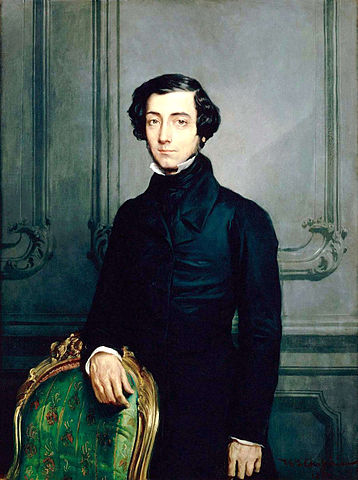
portrait by Theodore Chasserian
The European is to other races of men what man in general is to animate nature. When he cannot bend them to his use or make them serve his self-interests, he destroys them and makes them vanish little by little before him.
Observer, social historian
Born in Paris on July 29,
1805, Alexis de Tocqueville was an aristocrat by birth, and
many of his relatives were killed during the bloody tyranny of the
Reign of Terror.
He travelled through
America - ostensibly to study the penitentiary system - with a
friend, Gustave de Beaumont in 1831-32. His extraordinary
observations of life in the new republic, Democracy in
Ameria, were published four volumes, the first appearing in
1835.
Like the second president, John Adams, whom
he very much admired, deTocqueville loved liberty but he detested
the crimes that had been committed in its name. Belonging
neither to the class which regarded the social revolution as an
innovation to be resisted, nor to that which considered political
equality the universal panacea for the evils of humanity, he
resolved by personal observation of the results of democracy in the
New World to ascertain its natural consequences, and to let his
countrymen know what they had to hope, or fear, from this new
republic.
A decade before John O'Sullivan coined the term
Manifest Destiny, de Tocqueville peered into the
American future - and across the frontier - with clear
vision. "This gradual and continuous progress of the European
toward the Rocky Mountains has the solemnity of a providential
event; it is like a deluge of men rising unabatedly, and daily
driven onward by the hand of God!"
His mission, he said, was motivated by a burning desire to
understand the "agitations that compelled France to attempt to
grasp suddenly the liberties and happiness when had gained in our
revolution," and, thanks to his devotion to his home country,
the young de Tocqueville was determined to "search out and subject
to the test of reason" the basic principles of free government that
had been embodied in the U.S. Constitutuion. It has often
been said that no mission was ever more honorably or justly
conducted, or concluded with greater success or better results for
the welfare of mankind. His researches were logical and
exhaustive.
Related People
Related Events
Related Flashpoints
Related Places